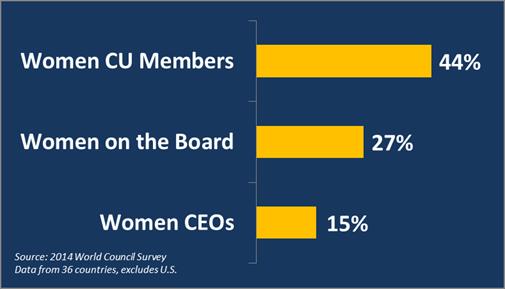Sometimes it's hard to believe, but over time society has become a much less violent. In general, murder rates have gone down. One thing that has not changed in some places is the treatment of women. Unbelievably almost, child marriages still take place and bride burnings and acid attacks are nearly as common.
The myriad stories Sheryl WuDunn chronicles in her book, Half the Sky , co-written with her husband, fellow-Pulitzer Prize winning journalist Nicholas Kristof, have helped her to appreciate what she has while still fighting for more for women around the world: More freedom, more healthcare, more food, more respect. Just more.
Following her address at the Global Women's Leadership Network during the World Council of Credit Unions ' Annual Meeting, I had the privilege of sitting down with Sheryl to discuss the book, American women's career advancement issues, life and, yes, credit unions."What I really liked was that the credit union was founded on the principal of microsavings," Sheryl explained about why she was attracted to speak to the credit union group. Half the Sky is fraught will stories of women who gain access to capital and enabled to build a better life for themselves and their families, overcoming conditions unimaginable in the U.S. Take for example, Goretti Nyabenda of Burundi in Africa, who disobeyed her drunken husband to form a CARE group, which brought women together to talk about their circumstances and pool their meager funds to take turns borrowing from the pool of funds. Additionally visiting nurses provide basic healthcare and HIV testing. Goretti bought fertilizer with the money she borrowed from her CARE group to improve her potato crop, which served her very well. She was able to expand her banana beer business and to buy a pregnant goat that brought her another goat a few weeks later and milk. At night the goats come into her family's home to sleep so no one will steal them. This is Goretti's success story.
The tale from halfway around the world certainly puts things into perspective for women in developed countries like the U.S. dealing with workplace challenges. Those are still very important and working women still deserve greater progress, but the story of Goretti and others in Half the Sky helps ground us. Microfinance in developing countries is also an area where WOCCU and credit unions can have a significant impact, and already are.
What Goretti learned and built herself with was a network. Female professionals must do the same. It's time to stop taking pity on Goretti, and take a lesson from her. Sheryl WuDunn emphasized this point with me during our conversation. "You need to be a part of a network and networks only work if there's trust among the network," she emphasized. Women who achieve success also need to realize that they have to help the women below them on the corporate ladder in order to stay on top.
It's a point the Sheryl Sandberg also made in Lean In. Some of the well-established female executive built their careers during a time when it was fashionable to have a token woman among the senior ranks-but only one. That led some to keep other women down.The modern female executive must keep in mind, as Sheryl WuDunn added, "You don't get to stay on the top if you don't build support from the bottom."
She continued, "Everybody's heard of the old boys' network and that was very effective...Women just want other things that they can talk about and build camaraderie around." It's human nature that people feel more comfortable around other people like them, but female managers must be careful to expand their networks beyond other women. Sheryl advised that networks should be co-ed because we can all learn a lot from each other.
By Sarah Snell Cooke
Publisher/editor-in-chief of CU Times


